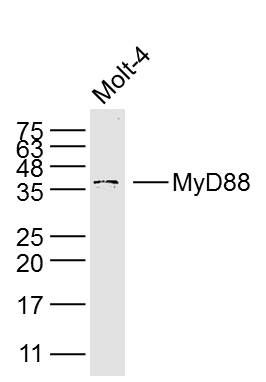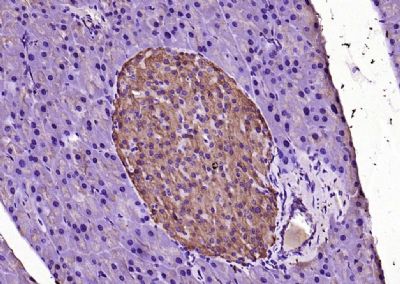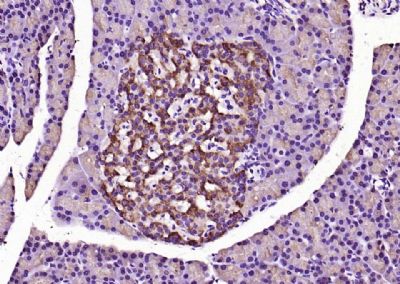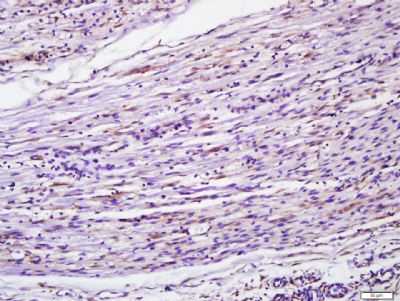上海细胞库
人源细胞系| 稳转细胞系| 基因敲除株| 基因点突变细胞株| 基因过表达细胞株| 重组细胞系| 猪的细胞系| 马细胞系| 兔的细胞系| 犬的细胞系| 山羊的细胞系| 鱼的细胞系| 猴的细胞系| 仓鼠的细胞系| 狗的细胞系| 牛的细胞| 大鼠细胞系| 小鼠细胞系| 其他细胞系|

| 规格 | 价格 | 库存 |
|---|---|---|
| 50ul | ¥ 980 | 200 |
| 100ul | ¥ 1680 | 200 |
| 200ul | ¥ 2200 | 200 |
| 中文名称 | 髓样分化蛋白抗体 |
| 别 名 | myeloid differential protein-88; Myeloid differentiation primary response gene; MYD 88; MYD88D; Myeloid differentiation marker 88; Myeloid differentiation primary response gene 88; Myeloid differentiation primary response gene; Myeloid differentiation primary response protein MyD88; MYD 88; Myd88; MYD88_HUMAN; OTTHUMP00000161718; OTTHUMP00000208595; OTTHUMP00000209058; OTTHUMP00000209059; OTTHUMP00000209060. |
| 研究领域 | 细胞生物 免疫学 神经生物学 |
| 抗体来源 | Rabbit |
| 克隆类型 | Polyclonal |
| 交叉反应 | Human, Mouse, Rat, |
| 产品应用 | WB=1:500-2000 ELISA=1:500-1000 IHC-P=1:100-500 IHC-F=1:100-500 IF=1:100-500 (石蜡切片需做抗原修复) not yet tested in other applications. optimal dilutions/concentrations should be determined by the end user. |
| 分 子 量 | 34kDa |
| 细胞定位 | 细胞浆 |
| 性 状 | Liquid |
| 浓 度 | 1mg/ml |
| 免 疫 原 | KLH conjugated synthetic peptide derived from mouse MyD88:201-296/296 |
| 亚 型 | IgG |
| 纯化方法 | affinity purified by Protein A |
| 储 存 液 | 0.01M TBS(pH7.4) with 1% BSA, 0.03% Proclin300 and 50% Glycerol. |
| 保存条件 | Shipped at 4℃. Store at -20 °C for one year. Avoid repeated freeze/thaw cycles. |
| PubMed | PubMed |
| 产品介绍 | This gene encodes a cytosolic adapter protein that plays a central role in the innate and adaptive immune response. This protein functions as an essential signal transducer in the interleukin-1 and Toll-like receptor signaling pathways. These pathways regulate that activation of numerous proinflammatory genes. The encoded protein consists of an N-terminal death domain and a C-terminal Toll-interleukin1 receptor domain. Patients with defects in this gene have an increased susceptibility to pyogenic bacterial infections. Alternate splicing results in multiple transcript variants. [provided by RefSeq, Feb 2010]. Function: Adapter protein involved in the Toll-like receptor and IL-1 receptor signaling pathway in the innate immune response. Acts via IRAK1, IRAK2, IRF7 and TRAF6, leading to NF-kappa-B activation, cytokine secretion and the inflammatory response. Increases IL-8 transcription. Involved in IL-18-mediated signaling pathway. Activates IRF1 resulting in its rapid migration into the nucleus to mediate an efficient induction of IFN-beta, NOS2/INOS, and IL12A genes. MyD88-mediated signaling in intestinal epithelial cells is crucial for maintenance of gut homeostasis and controls the expression of the antimicrobial lectin REG3G in the small intestine. Subunit: Homodimer. Also forms heterodimers with TIRAP. Binds to TLR2, TLR4, IRAK1, IRAK2 and IRAK4 via their respective TIR domains. Interacts with IL18R1 (By similarity). Interacts with BMX, IL1RL1 and IRF7. Interacts with LRRFIP1 and LRRFIP2; this interaction positively regulates Toll-like receptor (TLR) signaling in response to agonist. Interacts with FLII. LRRFIP1 and LRRFIP2 compete with FLII for MYD88-binding. Interacts with IRF1. May interact with PIK3AP1 (By similarity). Upon IL1B treatment, forms a complex with PELI1, IRAK1, IRAK4 and TRAF6; this complex recruits MAP3K7/TAK1, TAB1 and TAB2 to mediate NF-kappa-B activation. Direct binding of SMAD6 to PELI1 prevents the complex formation and hence negatively regulates IL1R-TLR signaling and eventually NF-kappa-B-mediated gene expression. Subcellular Location: Cytoplasm. Tissue Specificity: Ubiquitous. DISEASE: Defects in MYD88 are the cause of MYD88 deficiency (MYD88D) [MIM:612260]; also known as recurrent pyogenic bacterial infections due to MYD88 deficiency. Patients suffer from autosomal recessive, life-threatening, often recurrent pyogenic bacterial infections, including invasive pneumococcal disease, and die between 1 and 11 months of age. Surviving patients are otherwise healthy, with normal resistance to other microbes, and their clinical status improved with age. Similarity: Contains 1 death domain. Contains 1 TIR domain. SWISS: P22366 Gene ID: 17874 Database links: Entrez Gene: 4615 Human Entrez Gene: 17874 Mouse Entrez Gene: 301059 Rat Omim: 602170 Human SwissProt: Q99836 Human SwissProt: P22366 Mouse SwissProt: Q6Y1S1 Rat Unigene: 82116 Human Unigene: 213003 Mouse Unigene: 37341 Rat Important Note: This product as supplied is intended for research use only, not for use in human, therapeutic or diagnostic applications. MyD88是天然免疫中的调控分子,可能在感染、炎症、免疫等病理生理过程中具有更广泛的生物学功能, MyD88蛋白是由Toll样受体介导的先天免疫应答反应中重要的胞浆接头蛋白,由它参与构成的信号级联最终引起NF-kB依赖性信号通路的活化。 |
| 产品图片 |  Sample: Molt-4 Cell (Human) Lysate at 40 ug Sample: Molt-4 Cell (Human) Lysate at 40 ugPrimary: Anti-MyD88 (bs-1047R) at 1/300 dilution Secondary: IRDye800CW Goat Anti-Rabbit IgG at 1/20000 dilution Predicted band size: 34 kD Observed band size: 36 kD Tissue/cell: mouse lung tissue; 4% Paraformaldehyde-fixed and paraffin-embedded; Antigen retrieval: citrate buffer ( 0.01M, pH 6.0 ), Boiling bathing for 15min; Block endogenous peroxidase by 3% Hydrogen peroxide for 30min; Blocking buffer (normal goat serum,C-0005) at 37℃ for 20 min; Incubation: Anti-MyD88 Polyclonal Antibody, Unconjugated(bs-1047R) 1:200, overnight at 4°C, followed by conjugation to the secondary antibody(SP-0023) and DAB(C-0010) staining  Paraformaldehyde-fixed, paraffin embedded (rat pancreas); Antigen retrieval by boiling in sodium citrate buffer (pH6.0) for 15min; Block endogenous peroxidase by 3% hydrogen peroxide for 20 minutes; Blocking buffer (normal goat serum) at 37°C for 30min; Antibody incubation with (MyD88) Polyclonal Antibody, Unconjugated (bs-1047R) at 1:200 overnight at 4°C, followed by operating according to SP Kit(Rabbit) (sp-0023) instructionsand DAB staining. Paraformaldehyde-fixed, paraffin embedded (rat pancreas); Antigen retrieval by boiling in sodium citrate buffer (pH6.0) for 15min; Block endogenous peroxidase by 3% hydrogen peroxide for 20 minutes; Blocking buffer (normal goat serum) at 37°C for 30min; Antibody incubation with (MyD88) Polyclonal Antibody, Unconjugated (bs-1047R) at 1:200 overnight at 4°C, followed by operating according to SP Kit(Rabbit) (sp-0023) instructionsand DAB staining. Paraformaldehyde-fixed, paraffin embedded (mouse pancreas); Antigen retrieval by boiling in sodium citrate buffer (pH6.0) for 15min; Block endogenous peroxidase by 3% hydrogen peroxide for 20 minutes; Blocking buffer (normal goat serum) at 37°C for 30min; Antibody incubation with (MyD88) Polyclonal Antibody, Unconjugated (bs-1047R) at 1:200 overnight at 4°C, followed by operating according to SP Kit(Rabbit) (sp-0023) instructionsand DAB staining. Paraformaldehyde-fixed, paraffin embedded (mouse pancreas); Antigen retrieval by boiling in sodium citrate buffer (pH6.0) for 15min; Block endogenous peroxidase by 3% hydrogen peroxide for 20 minutes; Blocking buffer (normal goat serum) at 37°C for 30min; Antibody incubation with (MyD88) Polyclonal Antibody, Unconjugated (bs-1047R) at 1:200 overnight at 4°C, followed by operating according to SP Kit(Rabbit) (sp-0023) instructionsand DAB staining. Paraformaldehyde-fixed, paraffin embedded (mouse kidney tissue); Antigen retrieval by boiling in sodium citrate buffer (pH6.0) for 15min; Block endogenous peroxidase by 3% hydrogen peroxide for 20 minutes; Blocking buffer (normal goat serum) at 37°C for 30min; Antibody incubation with (HO-1) Polyclonal Antibody, Unconjugated (bs-0827R) at 1:400 overnight at 4°C, followed by a conjugated secondary (sp-0023) for 20 minutes and DAB staining. Paraformaldehyde-fixed, paraffin embedded (mouse kidney tissue); Antigen retrieval by boiling in sodium citrate buffer (pH6.0) for 15min; Block endogenous peroxidase by 3% hydrogen peroxide for 20 minutes; Blocking buffer (normal goat serum) at 37°C for 30min; Antibody incubation with (HO-1) Polyclonal Antibody, Unconjugated (bs-0827R) at 1:400 overnight at 4°C, followed by a conjugated secondary (sp-0023) for 20 minutes and DAB staining. |